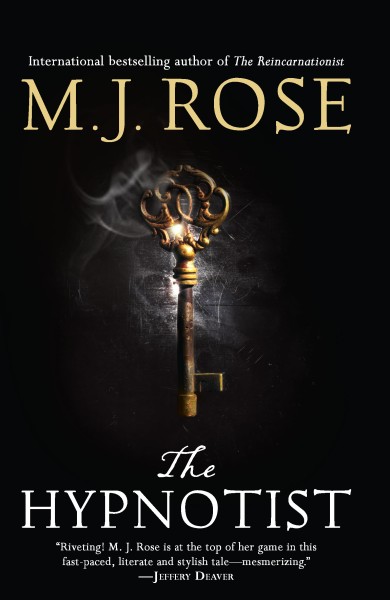I am pleased to welcome author M.J. Rose, author of The Hypnotist and several other wonderful books to Acting Balanced today. She is here as part of her Pump Up Your Book virtual blog tour and raises many thought provoking questions in her post about the value of social networking for writers - and I think that many of the questions can also be asked of bloggers and other professionals as well...
and several other wonderful books to Acting Balanced today. She is here as part of her Pump Up Your Book virtual blog tour and raises many thought provoking questions in her post about the value of social networking for writers - and I think that many of the questions can also be asked of bloggers and other professionals as well...
Here's an idea: Spend two or three hours a day at least five days a week in front of a bookstore wearing a sandwich board with your bookcover on it while you chase and chat with anyone you can corral and who is willing to talk to you.
Would that be a valuable way to spend a chunk of time? What size chunk of time? How would you decide?
If four people stopped to chat with you?
If, on the way out, two stopped to tell you they bought your book?
And how can you be sure the people you are talking to are even enjoying what you are saying? Are you reaching them? Or annoying them? How many of them might have bought your book if they saw it on the table but the sandwich board turned them off?
It's a fairly ridiculous scenario -- right?
And yet that's what many authors are doing every day by investing incredibly valuable writing time on what might turn out to just be tomorrow's MySpace -- Facebook and Twitter.
We're doing it because we're anxious and desperate to sell our books and to keep our sales high enough to keep our careers viable.
We're doing it because so many of our fellow writers are doing it.
And (in many cases) we're doing it only because our publishers are encouraging us to.
In fact many publishers are sending us cheat sheets on how to do it better. Some are even suggesting it's the only marketing worth doing. They are telling us this is the new way to get people to hear about our books.
And it does work at some level. But what is that level? What will it actually get us? And what happens to our creativity when it gets sucked up by Facebook and Twitter?
And does taking on this much more of the of the marketing burden really help publishers in the long run? Wouldn't they be best served proving their power -- not empowering us?
Even if Facebook and Twitter are wonder tools in the right hands -- how many of us can be Neil Gaiman or Jennifer Weiner? How many of us are really clever in 140 characters including spaces? How many of us are great at posting enchanting, provocative posts at Facebook? Just because we can tell a story doesn't mean we can chat.
Maybe even more important is that all those people who like us or friend us or follow us are not people whose email addresses we own -- not people we can be certain we can contact in the future.
For one thing the way feeds work -- how many people read backwards at social media sites? How easy is it to miss a post? But even more important, Facebook and Twitter own their sites and the information on them.
They can wipe any one of us out in a second and we lose all those fans and friends. (MySpace used to do this repeatedly.)
This is not a post about whether or not to have fun on Facebook and Twitter. Nor is it about the value of networking with your peers or people in your industry.
This is about the questions I hear over and over from writers and that I ask myself over and over:
How worthwhile is it for a writer to invest time in social media for marketing purposes, and how much time?
Should we torture ourselves to do it if it isn't in our DNA?
Does it really work?
Do the authors held up as examples rely on social networking as much as we think? Don't most of those big names also have big support from their publishers too as well as dedicated publicists and serious marketing campaigns?
Are our publishers right in pushing us to get out there and get strangers to like our Facebook pages and follow us on Twitter?
Is it a marketing solution?
Or is this a temporary fix to the problem our industry really needs to solve -- the real and vital and urgent problem of discovery -- of coming up with new and meaningful ways for readers to find new books?
Is the Social Net Working?
There is no debate that social media is a great tool for networking with others in our industry. It can lead to friendships, support, and serendipitous connections with reviewers, agents, reporters, or editors.
There's no debate that social media gives fans access to us. Of course it does. When it works there's nothing like it. One Tweet can be heard 'round the world if the right people retweet it and the right people notice it on their feeds.
And there's no debate that some readers will discover us via Twitter and Facebook or whatever tomorrow's next new great social network turns out to be.
The issue each of us has to address is, what is the return on the effort we are making? Or as author James Scott Bell calls it -- the ROE.
Is the time we are investing in social networking worth the effort? Is the pressure we're feeling to do it reasonable? How much of a toll is it taking on our work? After all, it is writing, and many writers have told me that after tweeting and posting on FB for two hours a day -- they don't have as much to say on the page. (I know I don't.)
So are we actually doing ourselves and our work a service? (There are inevitably going to be readers who get turned off when they find out what we're really like. Sometimes mystery works in a writer's favor.)
Would we be better off spending most of our time writing another book and hiring people to do PR and marketing and blog tours for us?
Well if you look at the stats we might be.
About M.J. Rose:
M.J. Rose is the international bestselling author of 11 novels; Lip Service, In Fidelity, Flesh Tones, Sheet Music, Lying in Bed, The Halo Effect, The Delilah Complex, The Venus Fix,The Reincarnationist, The Memorist and The Hypnotist.
Rose is also the co-author with Angela Adair Hoy ofHow to Publish and Promote Online, and with Doug Clegg of Buzz Your Book.
She is a founding member and board member ofInternational Thriller Writers and the founder of the first marketing company for authors: AuthorBuzz.com. She runs two popular blogs; Buzz, Balls & Hype andBackstory.
Getting published has been an adventure for Rose who self-published Lip Service late in 1998 after several traditional publishers turned it down. Editors had loved it, but didn’t know how to position it or market it since it didn’t fit into any one genre.
Frustrated, but curious and convinced that there was a readership for her work, she set up a web site where readers could download her book for $9.95 and began to seriously market the novel on the Internet.
 After selling over 2500 copies (in both electronic and trade paper format) Lip Service became the first e-book and the first self-published novel chosen by the LiteraryGuild/Doubleday Book Clubas well as being the first e-book to go on to be published by a mainstream New York publishing house.
After selling over 2500 copies (in both electronic and trade paper format) Lip Service became the first e-book and the first self-published novel chosen by the LiteraryGuild/Doubleday Book Clubas well as being the first e-book to go on to be published by a mainstream New York publishing house.
Rose has been profiled in Time magazine, Forbes, The New York Times, Business 2.0, Working Woman, Newsweek and New York Magazine.
Rose has appeared on The Today Show, Fox News, The Jim Lehrer NewsHour, and features on her have appeared in dozens of magazines and newspapers in the U.S. and abroad, includingUSAToday, Stern, L’Official, Poets and Writers and Publishers Weekly.
Rose graduated from Syracuse University and spent the ’80s in advertising. She was the Creative Director of Rosenfeld Sirowitz and Lawson and she has a commercial in the Museum of Modern Art in NYC.
She lives in Connecticut with Doug Scofield, a composer, and their very spoiled dog, Winka.
You can visit her website at www.mjrose.com

